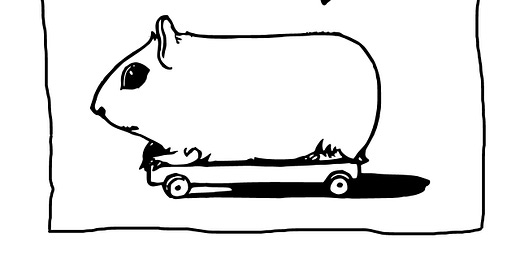Picture yourself deep in the action of the chariot tarot card: Animals pull the reins in opposite directions. You’re fighting to keep the beasts in tandem as the wheels spin wildly.
There’s friction and uncertainty. Perpetual way finding through chaos.
The chariot moves in a space of inbetween. Steering the ride is uncomfortable. And yet we spend so much time on the proverbial wagon, it seems important to at least recognise this feeling of passing through wilderness. Even if being at peace with it is a work in progress.
Precious corners
In Anne Lamott’s Bird by Bird, the cycles of life – represented above by the chariot's spinning wheels – are something that can’t be controlled. Our power lies in not knowing, but choosing how to navigate the path,
“We can choose…how we move towards and through and away from others, how we cultivate precious corners for ourselves and also feasts of connection and intimacy.”
Divine Comedy
The most famous literary take on this in between, unknowing space is Dante Alighieri's Purgatorio (Purgatory), the central volume from his 14th-century epic poem, The Divine Comedy.
Between Inferno and Paradiso, Purgatory is framed by dreams of wilderness and a mountain climb that gets easier as you rise. Prayer (we’ll call it action) is the one expedient that can speed up waiting time. And time is precious – even more so for those aware of it passing.
The essence of Dante's Purgatory? The inbetween can be a space for moral reflection. No one wants to stay still. The goal is entry to the next level, transcendence, Paradiso.
And yet many souls are stuck in Purgatory for an age. You can only climb the mountain in daylight.
Virgil acts as an angel for Dante. A literary guide towards the peak. Having your own guide – even if it’s an inner one of awareness – can help you navigate ahead and take what you can from the ride,
“Midway along the journey of our life / I woke to find myself in a dark wood, / for I had wandered off from the straight path.
How hard it is to tell what it was like, / this wood of wilderness, savage and stubborn / the thought of it brings back all my old fears,
A bitter place! Death could scarce be bitterer. / But if I would show the good that came of it / I must talk about things other than the good.”
Dante Alighieri, The Divine Comedy, Vol 2: Purgatorio
Time will pass
And yet to sit with these feelings over seeking the pleasures of distraction – to consciously reckon with what we don’t know – is the hardest thing.
The practised Stoic approach is to focus on what’s controllable, to align the reins of the chariot and stay in neutral,
“If we judge as good and evil only the things in the power of our own choice, then there is no room left for blaming gods or being hostile to others.”
Marcus Aurelius, Meditations, 6.41
Take it bird by bird
The cultural pressure to maintain a productive streak – to put process above result – through these inbetween moments is the tried-and-tested way through.
Rich Roll in conversation with author, Steve Pressfield explains,
“To take a break is something to interrupt momentum and momentum is something to be protected and respected above all. It has its own forcefield and energy about it and you don’t want to interrupt it. And so you have to always be in this perpetual motion from one thing to the next, which is about decoupling the work from the result of the work.”
In other words, keep going.
Rest is counter-cultural
One step ahead, there’s a movement seeking to harness that energy to make change for collective progress. Rest as Resistance calls out the ‘oppressive grip of grind culture’ with momentum geared towards activism and social good.
To ride out the space of in between through rest and activism is peak aspiration. Because taking steps to do better will always benefit those around you. Dante’s a creative case in point – The Divine Comedy was written in exile, after all.
His view of the mountain top captures the joys of a collective climb. To bring others up with us and meet at its pinnacle, is to manifest the good in ourselves,
“… the more souls there are who love, up there, / the more there are to love well, and the more love / they reflect to each other, as in a mirror.”
Peace as an art form
That space inbetween action and desired result is unsettling. It’s hard to be at peace with what you don’t (and perhaps will never) know. But with this comes freedom.
If we use the in between to define new beginnings for ourselves – in Lamott’s words, cultivate our own, “...feasts of connection and intimacy”– it can better signpost Paradiso.
In the inbetween, there is nothing but the freedom to choose. Wisdom at the heart of Zen philosophy sits with the mystery itself, and perhaps captures it best,
“Not knowing is most intimate.”
Hold it close as you steer the chariot.



